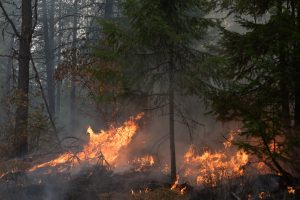MOSCOW, Idaho — Dec. 11, 2023 — A University of Idaho fire scientist is the recipient of the 2023 Jean’ne M. Shreeve National Science Foundation (NSF) Established Program to Stimulate Competitive Research (EPSCoR) Research Excellence Award.
Alistair Smith, professor and chair of the Department of Earth and Spatial Sciences, received the award during the Idaho EPSCoR Committee Annual Business Meeting held at Idaho State University in Pocatello on Nov. 2.

Alistair Smith, University of Idaho fire scientist
“Smith embodies the spirit of the Jean’ne Shreeve award by fostering innovative and collaborative research in fire science coupled with outstanding mentoring of junior scientists,” said Ginger E. Carney, dean of U of I’s College of Science. “His early career was supported by the EPSCoR program, and he has paid it forward by contributing to new EPSCoR initiatives, including the recently awarded $20 million EPSCoR Track 1 I-CREWS grant. Among his best qualities are the generous ways in which he supports colleagues at all levels. The university and state have greatly benefited from Smith’s contributions to research and training, and we are delighted to have such a respected colleague in the College of Science.”
Smith, an internationally recognized leader in wildland fire science, is an expert in pyroecophysiology, a new sub-field of fire ecology that he termed in 2017 that focuses on understanding how fires affect trees, why some die and, when they survive, what happens to them. His team’s research has had a major impact on changing the understanding of fire ecology, especially in the face of more intense and frequent fires under climate change.
“For years, many believed that when fires interact with trees, it may take a few years, but they all eventually will die,” Smith said. “My research shows that trees are a lot like us in that they experience something similar to first-, second- and third-degree burns, where the degree of fire intensity impacts how likely they will die, how fast they recover afterward, and how their vigor and health changes after the fires. My research has also changed the way people think about how fires kill trees. A lot of people think trees die of thirst after fires, but my team has shown that they die of starvation.”

University of Idaho professor Alistair Smith was recently awarded the NSF EPSCoR Award for his research studying how wildfires affect trees.
Inspired by U of I Distinguished Professor Jean’ne M. Shreeve for her imaginative leadership of EPSCoR in Idaho for more than 20 years, this award recognizes the accomplishments of faculty members at Boise State University, ISU, U of I or other state institutions of higher education who have previously been active participants in the NSF EPSCoR program.
“Smith is an outstanding recipient of this award,” said Dave Tuthill, assistant chair of the Idaho State EPSCoR Committee and chair of the Jean’ne Shreeve EPSCoR Research Excellence Award Selection Committee. “He has an exceptional record as a researcher, a graduate student mentor and an author of articles with national and international interest.”
Smith expressed his gratitude, not only for the recognition, but also for EPSCoR’s continued support over the years.
“I am deeply humbled as I owe my entire research program to EPSCoR’s initial support, and I will always continue to pay it forward to help others attain the same level of success they helped me achieve,” Smith said.
For more information about Idaho EPSCoR, visit idahoepscor.org. For more information about Smith’s work, visit pyroecophys.weebly.com.






